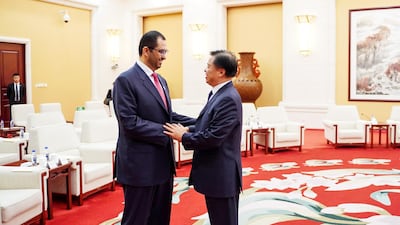Abu Dhabi National Oil Company (Adnoc) is exploring ways to deepen its investment partnership ties with major Chinese oil and gas firms, as the producer for 6 per cent of the world's oil reserves, looks to solidify its relations with one of the biggest crude importers globally.
Adnoc Group chief executive, Dr Sultan Al Jaber, held a series of meetings with Chinese oil, gas, refining and petrochemical industry firms during his recent visit to Beijing, the company said in a statement on Monday. The discussion focused on expanding existing partnerships and exploring new opportunities across Adnoc’s integrated upstream and downstream value chain, it said.
“Energy cooperation is an important aspect of the UAE’s relations with China, which is the number one oil importer globally and a major growth market for Adnoc’s crude, refined products and petrochemicals,” Dr Al Jaber, who is also UAE minister of state, said. “There are mutually beneficial partnership and co-investment opportunities across our upstream and downstream value chains. Adnoc is also ready to work with its existing and potential new partners to meet the growing demand for energy and petrochemical products in China.”
Crude consumption in China, the second-biggest global economy, is set to rise 4.6 per cent year-on-year to 12.05 million barrels per day this year, according to estimates by state-owned China National Petroleum Corporation’s (CNPC) research division. Consumption of refined products such as plastics and compounds, which are vital for Chinese growth and development of its expanding middle class, is forecast to grow about 31 per cent year-on-year to 47.8 million tonnes in 2018.
The country is the UAE’s biggest trading partner and Chinese state-backed oil and gas companies have already become one of the largest foreign investors in Abu Dhabi's energy sector, as Adnoc steps up efforts to engage the biggest consumers of its crude to become co-investors across its value chain.
____________
Read more:
Adnoc awards CNPC twin offshore concessions worth Dh4.3bn
Adnoc explores petchems, technology partnership with China
Adnoc offers first competitive bidding for oil and gas concessions
Adnoc sets up trading unit to boost revenue streams
____________
In March, CNPC picked up two stakes worth Dh4.3bn ($1.17bn) in offshore fields in Abu Dhabi, solidifying China’s status as one of the largest foreign energy partners in the country. PetroChina, which is majority-owned by CNPC, was awarded a 10 per cent interest both in Umm Shaif and Nasr as well as the Lower Zakum concessions, Adnoc said in a statement at the time.
Adnoc, which revamped its business model earlier this year, has received strong interest from Chinese firms for onshore and offshore oil and gas concessions being offered in the first-ever round of competitive bidding proposed as part of its new partnership model, Tayba Al Hashemi, acting CEO of Adnoc unit Al Yasat Petroleum told a conference in May in Beijing.
“The release of the six blocks for competitive bidding represents a rare and exciting opportunity to invest in the UAE’s stable and secure exploration and production sector,” Dr Al Jaber said on Monday.
During the visit, Dr Al Jaber met with senior executives from Wanhua Chemical Group, CNPC and China National Offshore Oil Corporation. He also met with representatives from the China Development Bank and top officials of National Development and Reform Commission in China.
Adnoc is making significant investments in new downstream projects and petrochemical complexes at Ruwais, one of the world’s largest integrated refining facilities once completed. That is at the heart of the company downstream ambitions.
“The expansion of our downstream portfolio will allow partners who contribute finance, give access to technology and knowledge and facilitate market access, to invest and benefit, with us, from the growing demand for petrochemicals, particularly in Asia,” Dr Al Jaber said. “We believe there is enormous potential to expand our relationship with Chinese companies, especially in the downstream.”
Meanwhile, Adnoc remains focused on market expansion in China and Asia, where demand for petrochemicals and plastics, including light-weight automotive components is forecast to double by 2040. China is the largest export customer in Asia for Borouge, a petrochemicals joint venture between Adnoc and Borealis, according to the statement.


